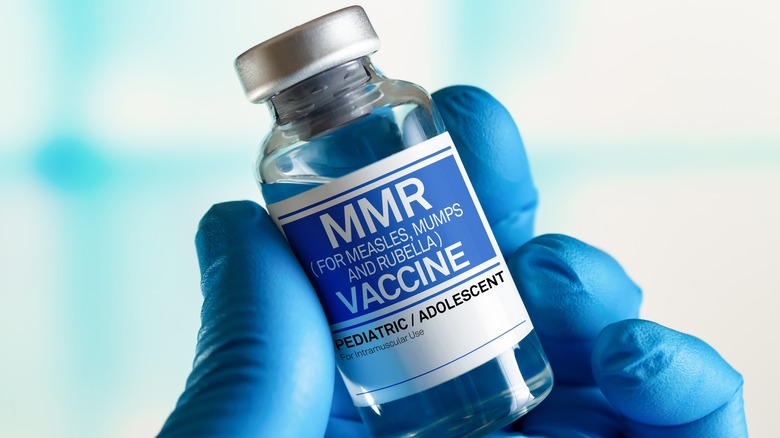What The Resurgence In Mumps Is Leading Experts To Theorize
Mumps is a disease caused by a virus that can mimic flu symptoms, according to the Mayo Clinic. People with mumps might experience fever, fatigue, or lack of appetite, although some might have mild or no symptoms. After that, people might experience swelling on the side of the face because the virus affects the salivary glands. According to the U.S. Department of Health and Human Services, both the MMR and MMRV vaccines can protect you from the mumps.
But that doesn't mean that outbreaks can't occur, even among the vaccinated, according to the Centers for Disease Control and Prevention (CDC). Outbreaks have occurred in places where close contact is common, such as college campuses, detention facilities, and close-knit communities. Although the U.S. had only 322 cases of mumps in 2022, it saw more than 6,000 cases in 2006, 2016, and 2017.
A 2023 research article published in Proceedings of the National Academy of Sciences (PNAS) looked at why the U.S. doesn't have population-level immunity to mumps. They researched two possible theories — whether the vaccine weakens over time or whether new variants of the mumps virus can dodge the vaccine.
Our immunity against mumps can weaken
The PNAS research article gathered data about when people got the vaccine and whether or not they got the mumps. The researchers used statistical analysis to test both of their theories. The analysis supported the weakened vaccine immunity theory, finding that one in three people lose their immunity to mumps by age 18. The researchers suggested that this could explain why older people are getting mumps as well as the reason for recent mumps outbreaks among those who were vaccinated.
But this doesn't mean the vaccine program hasn't been effective, according to the CDC. Mumps was a common childhood illness before the two-dose MMR vaccine program began in 1967. After that, cases decreased by more than 99%. The CDC says the vaccine is effective in controlling these outbreaks.
According to U.S. News & World Report, even if the MMR vaccine is waning in its protection against mumps, the vaccine still can protect you from getting severely ill. The MMR vaccine still keeps people immune to measles and rubella, and boosters aren't necessary unless there's a local outbreak.


